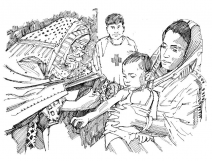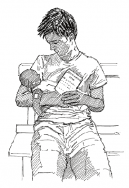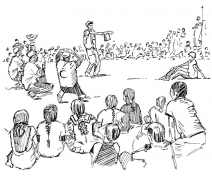46. Oral cholera vaccine campaign
46. Oral cholera vaccine campaign
Last update: 2023-04-03
Overview
- The oral cholera vaccine (OCV) protects people from getting and developing severe forms of cholera and from spreading cholera to others.
- Outside of routine immunization schedules, OCV may be provided in response to, or in the prevention of, a cholera outbreak. A mass OCV campaign occurs when authorities vaccinate as many people over one year of age as possible against cholera in a short period of time.
- Mass oral cholera vaccination is carried out in addition to routine vaccinations (see Action Tool Routine vaccinations) to help control a cholera epidemic.
- For optimal community protection, everyone over one year of age should be vaccinated as part of the OCV campaign. It is safe to vaccinate pregnant and breastfeeding women.
What to do and how to do it
- Use the National Society’s network to publicize outbreak response or preventive vaccination campaigns. Help logistically to organize them.
- Make sure you have all the relevant information and know where and when the vaccination campaign is taking place and who is supposed to be vaccinated.
- Find out the reasons for vaccination and the basic facts about the disease that vaccination will prevent.
Promoting OCV mass vaccination
- Help health workers to ensure that all individuals above one year of age get vaccinated in all targeted areas. Use simple and straightforward messages. Such as:
- OCV is a vaccine that can protect persons from getting sick with cholera.
- The cholera vaccine is given by mouth and two doses are required.
- It can help to reduce the transmission of cholera and will protect our communities from cholera.
- It is safe and has very few (mostly minor) side effects. Very rarely people have abdominal discomfort or diarrhoea but it lasts a short time.
- It offers good protection against cholera for up to two thirds of those vaccinated. If you get cholera, you will not develop a severe form of the disease.
- If you take two doses, it is protective for at least three years. It is not perfect and does not cover other causes of diarrhoea. People still need to practise good hygiene, treat the water, practise good sanitation and get treatment if they get sick
- OCV is not the sole solution to stopping cholera; it should be used along with clean water, adequate sanitation and good personal hygiene. All this is necessary for the prevention of the disease. In addition, early and appropriate treatment is necessary to reduce illness and deaths from cholera.
- Building safe water systems and sanitation facilities is essential for the prevention and control of cholera (and other waterborne diseases); however, these changes take time and will require more resources, while cholera is a problem now. So OCV is a good way to protect your family, your community and yourself while working at improving the infrastructure.
- Disseminate well in advance the location, vaccination site hours, the number of vaccination days and age groups targeted.
Social mobilization, messaging and community engagement
- The most important task is SOCIAL MOBILIZATION (see Action Tool Social mobilization and behaviour change).
- Coordinate with the health authorities
- Familiarize yourself with the habits and beliefs of members of your community and how they normally deal with vaccinations.
- Meet community leaders and discuss the campaign with them; discuss with them the ideas they have about the vaccine and the campaign and get them to help reach the community.
- Talk to members of the community and explain how important vaccination is to protect the whole community, children, and especially those under one year of age who cannot be vaccinated.
- If some members of the community are afraid of vaccinations, assist community workers to calm and remove their fears.
- Listen to the rumours and misinformation about OCV. Discuss with community members and respond with the appropriate information.
- Use information, education and communication materials, such as the Community message tools in this toolkit, because pictures always help people to understand messages better.
- If requested by health authorities and /or other actors responsible for administering the vaccines, give support with crowd control. This can be by managing the influx of people in the queue; assisting in checking the target age group and characteristics; and collaborating with community leaders to maintain order. Other tasks such as registering people, dispensing other items such as vitamins or setting up vaccination spaces may be undertaken if requested by and in coordination with the health actor responsible for administering the vaccines.


